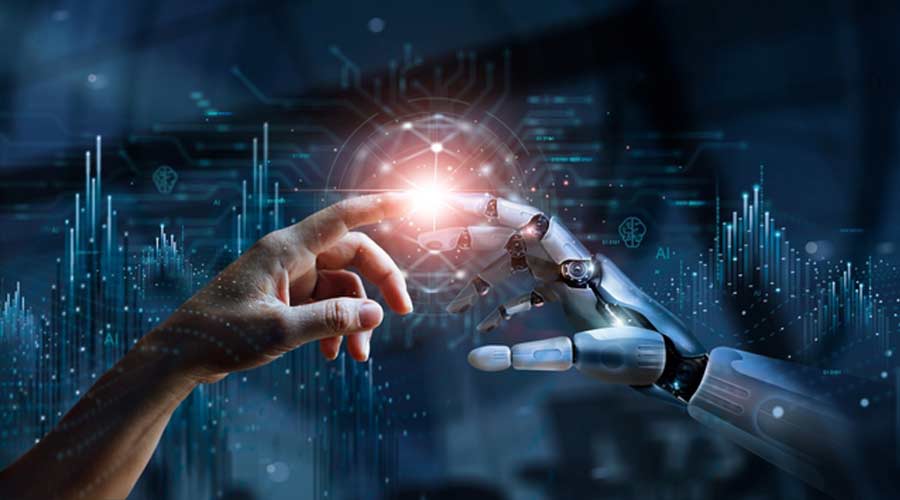
Contributed by Jeremy Maready
Todd Jones has watched in recent years as offices adopted AI technology, along with fast food restaurants and other industries. Now AI has found its way into everyday life.
As the owner of four Office Pride Commercial Cleaning Services locations in Virginia, he’s also implemented it into his own franchise, and it’s changing how he does business.
“It really makes sense because it eliminates a lot of redundant work,” he said. “With that, the people we hire can do something else, maybe something at a higher level. We’re seeing a lot of automation in the commercial cleaning industry.”
The global market for cleaning robots is exploding and is forecasted to reach $61 billion by 2034, according to a report from The Niche Research earlier this year. This trend has been fueled by global production efficiencies, improvements in technology and rising labor costs.
“Cleaning robots, also known as robotic vacuum cleaners or autonomous floor cleaners, are equipped with sensors and AI algorithms to navigate and clean floors without human intervention,” according to the report. “These robots cater to both residential and commercial markets, offering efficiency, convenience, and cost-effectiveness.”
Currently Jones owns and operates two of the AI machines for floor scrubbing, but he plans to add more as demand from clients increases. It’s quite the change from the commercial cleaning industry that his father worked in.
Commercial Cleaning Background
Jones is a second-generation commercial cleaning owner in his family. His father had his own local company in 1974, where Jones learned the ropes and held various management positions through the years.
“My father started the business as an independent owner and built the business up to a decent size,” he said. “I went on and I worked in the business in high school and did different jobs, and then went to college.”
Eventually, Jones’ father retired, and he bought the business and continued its success. Along the way, he met Todd Hopkins, Office Pride’s founder, in 2009. Hopkins recruited Jones to become an area developer for Office Pride to help grow the company’s Virginia market.
“As an area developer, you coach, manage and support owners,” he said.
Jones’ four Office Pride locations are in Virginia Beach, Norfolk, Richmond-Glen Allen and Newport News. Since his father opened his own cleaning business, Jones has witnessed a lot of different innovations in the cleaning industry.
“But one of the newer things we continue to see are AI autonomous machines,” he said. “We're seeing more and more of that.”
AI and Modern Commercial Cleaning
Jones first saw the use of AI machines with automated forklifts about 20 years ago. They were efficient but pricey. But at the time, the technology hadn’t reached the commercial cleaning market.
He recalls first seeing AI cleaning machines at a BSCAI conference, he said. “In the beginning, they were more of a novelty and very expensive.”
While the innovations of AI in commercial cleaning are quite remarkable today, they haven’t developed to the point where they make sense for every client, Jones said.
“They can navigate. They’ve got their system and tracking,” he said. “And then, if anything steps in the way, they'll stop. And they'll communicate with the person who's in charge if there's a problem with all that.”
Jones, who currently owns two of the COBI 18 robotic floor vacuum and scrubbers, said the machines are popular with larger clients that have significant space, like a warehouse, to clean.
For one of his clients, a German manufacturing company, it made a lot of sense. Right now, the technology is more beneficial for larger facilities that have expansive floor space, like warehouses or large office buildings.
“Right now, we're using it in their administration building, which is a good-sized building,” Jones said. “We're using one vacuum machine and one hard floor scrubbing machine.”
For Jones, the biggest return on the machine investment is in using less manpower.
“We're all under pressure to staff,” he said. “You can't always find the amount of staff you need. Unemployment going up is helping to find some extra staffing, but it's still a situation where it can be hard to staff.”
Jones doesn’t see the future of cleaning and AI as one where machines replace humans, but it will provide for different roles for commercial cleaners who work with them.
While some jobs require strict attention to minor details, cracks and crevices that would be too difficult for a machine to reach, the human element will still be needed. But for other, broader applications where machines can work well, humans will take more of a higher-level management approach, he thinks. “We're not there in the commercial cleaning industry just yet. But you know, I could see the day that we are much closer to that.”
posted on 12/2/2024

 Celebrating BSCAI's 60th Anniversary eBook
Celebrating BSCAI's 60th Anniversary eBook The Down and Dirty on Cleaning in Virus Season
The Down and Dirty on Cleaning in Virus Season How Surfactant Use is Expanding in Commercial Cleaning
How Surfactant Use is Expanding in Commercial Cleaning